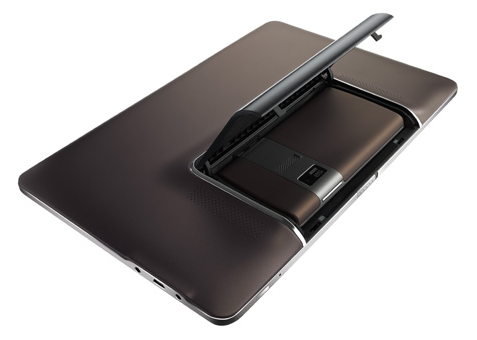The Asus Padfone seemed to have gone into hibernation after it’s Computex debut way back in May. It popped up at CES and now, according to a story from MoDaCo, the Asus Padfone will be officially announced at Mobile World Congress (MWC) at the end of February in Barcelona.
Using the world ‘announced’ might be a bit confusing because Asus already officially revealed the device. However, the initial unveiling at Computex was more of a demonstration of a concept design, while I would expect the announcement from MWC to show off production model with the inclusion of pricing and release information.
The Asus Padfone has a heretofore unique form-factor which allows you to dock a seemingly regular smartphone with a tablet-dock to essentially turn the phone into a tablet. All of the memory, processing, sensors, and cameras are contained within the phone itself, while the tablet-dock is nothing more than a 10.1″ 1280×800 touchscreen and battery.
Will the Asus Padfone Have Nvidia Tegra 3?
Paul from MoDaCo expects the Asus Padfone to be announced newly designed with Nvidia Tegra 3, but I’m not so sure. We saw a number of phones announced at CES 2012 based on Tegra 3, and while space probably isn’t a concern, price might be. Running the latest and greatest hardware in addition to selling the Padfone with an external screen/docking unit (and battery!) might make the phone impractically expensive. It wasn’t announced officially that the Asus Padfone was running Tegra 2 back in May, but we’re banking on that given the time frame in which it was announced. That doesn’t necessarily prevent them from redesigning the device for Tegra 3, but if they want to actually move a significant number of Padfone’s, they’ll need to be able to sell it (dock included) no more expensive than what a decent tablet would cost.
In the US, smartphones are heavily subsidized by carriers, but carries here tend to steer clear of less established form-factors. If Asus wants to sell the Padfone in the US, they’ll probably be selling to customers, rather than carriers. Without the carrier subsidy, the Padfone could be looking at a $600+ pricetag — keeping costs down would be vital to US sales. However, being a Taiwanese company, the US probably isn’t their primary demographic.
You can be almost certain of an external redesign of the prototype version of the Asus Padfone that we saw in May and at CES; that much is clear. The Padfone was still running an Android 2.x build when it was announced which means it had the standard four ‘Android buttons’ at the bottom of the phone screen. As of Android 4.0 ICS, the buttons are now built into the software, making the hardware buttons on the Padfone usless. The production model will have these removed, and I imagine Asus will update the docking screen to give it a more contemporary look.
I don’t think there’s enough evidence right now to say whether or not the Asus Padfone will have Tegra 3. I’m very interested to see how Asus plays this one. There’s always the chance that they include Tegra 3 at extra cost, but sell the docking-tablet separately (as they do with the Transformer and Transformer Prime).
Asus Padfone and Android 4.0
It seems Asus always had the intention of using Android 4.0 Ice Cream Sandwich to provide both a tablet or phone interface depending upon whether or not the phone is docked. When it was originally demonstrated, Android 4.0 ICS was still a ways off. At CES, however, Asus showed-off the Padfone running the very latest Android build (still prototype hardware). Curiously, it was also confirmed that the Padfone uses the same docking connector as the original Transformer — presumably the keyboard dock could be used with the phone (though it might need hacking). Here’s the Asus Padfone running Android 4.0 ICS, thanks to our friends at Netbook News:














